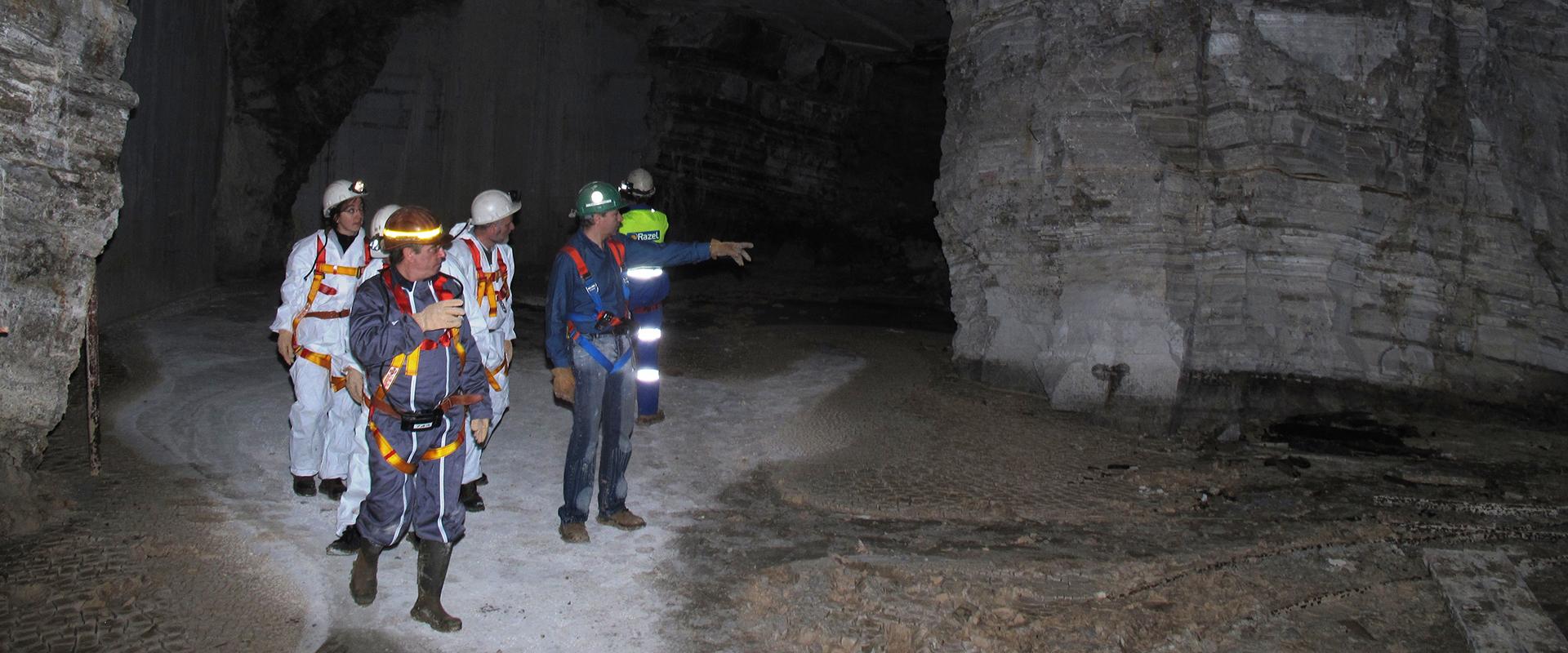With pit closures and the gradual disappearance of mining operators, a new “post-mining” era began in France.
Various legislative measures provide that the State shall stand surety for damage caused by the operator’s activity when this latter is not in a position to do so or is no longer in existence and place under State care the installations and equipment needed for prevention and safety.
Preserving skills and transmitting knowledge in the mining professions are other essential stakes in the post-mine era. Understanding phenomena, mapping sites and monitoring derelict mining zones create the need to perpetuate and add to existing technical literature, and to align it with changing needs.
After the intensive mining activity that once was one of the pillars of its industrial might, France today has instituted a legislative framework, an organization and means to accompany an inevitable mutation and to allow the mining adventure to continue to occupy its rightful place in our social, cultural, scientific and technical heritage.
Post-mine safety and risk prevention are guaranteed by the public authorities
The State has important responsibilities in the post-mining field, which are exercised through an organisational structure covering all social, institutional, organisational and legal aspects.
The functions within the remit of the State are exercised by the competent central authority (Ministry for Ecology) and the relevant decentralised authorities (DREAL). Expert assessment and research functions are exercised respectively by the GEODERIS public interest group and the GISOS scientific interest group.
A government decree issued on 4 April 2006 attributed all operational functions to BRGM, which established a dedicated department for this purpose, the Mine Safety and Risk Prevention Department (DPSM).

Operational post-mining: a Mine Safety and Risk Prevention Department at BRGM
BRGM has a specific department to run its post-mining activities. BRGM’s responsibilities for mine safety are carried out through its 4 regional post-mining units, covering the French mining basins:
- the regional Post-Mining Units (Utam) North, based at Billy-Montigny, covers the Champagne-Ardenne, Nord-Pas-de-Calais and Picardy former regions;
- the regional Post-Mining Units (Utam) East, based at Freyming-Merlebach, covers the Alsace, Franche-Comté and Lorraine former regions;
- the regional Post-Mining Units (Utam) Centre West, based at Orléans, covers the Auvergne, Burgundy, Brittany, Centre, Ile-de-France, Limousin, Lower Normandy, Upper Normandy, Pays de la Loire and Poitou-Charentes former regions;
- the regional Post-Mining Units (Utam) South, based at Gardanne, covers the Aquitaine, Corsica, Languedoc-Roussillon, Midi-Pyrénées, Provence-Alpes-Côte d'Azur and Rhône-Alpes former regions.
BRGM, the State-delegated post-mining operator
Since 2006, BRGM has managed surveillance and risk prevention activities to ensure the safety of decommissioned mining sites on behalf of the State.
Its responsibilities include:
- mine safety engineering work, as the delegate project owner.
- surveillance of former mining sites and running of safety and risk prevention facilities, in compliance with the Mining or Environment Code.
The goal is to ensure the safety of people and property in former mining areas.
Building on and furthering knowledge on former mining sites
Understanding the phenomena at work and mapping, characterising and monitoring former mining sites all rely on conserving, enriching and updating existing technical documentation.
BRGM manages the post-mining information system, particularly the collections of intermediate technical mining archives, and contributes to mining intelligence.
Preserving mining know-how
Preserving know-how on mining through knowledge transmission is another crucial post-mining issue.

Research and expert studies: Gisos and Geoderis
The State’s responsibilities in the field of post-mining are delegated to several organisations: the ministry for Ecology and the DREAL (regional offices for the environment, planning and housing) for governance functions, and BRGM for operational functions.
Research and expert studies are handled respectively by the Gisos scientific interest group (research) and the Geoderis public interest group (expert studies).
Post-mining research
For research in the field of post-mining, BRGM works through Gisos (scientific interest group on impacts and safety of subterranean engineering works), established in 1999 by BRGM, Ineris (French national institute for the industrial environment and risks), INPL (Lorraine national polytechnic institute) and Mines ParisTech.
Gisos research focuses on three priority areas:
- Terrain behaviour and surface impacts of changes in natural and artificial subterranean cavities.
- Impacts of subterranean works and water table rise (when dewatering ceases) on underground water resources and the quality of surface and groundwaters.
- Assessments and management of risks arising from subterranean works.
The aim is to better understand, analyse and model the phenomena at work in order to predict and prevent negative technical, social, economic and public safety repercussions.
BRGM contributes to the research conducted through Gisos by:
- supplying data and experimentation sites;
- proposing research themes aiming to improve monitoring practice and optimise the safety of people and property at an optimum cost to society;
- contributing to ongoing research in areas linked to its own activities.
Post-mining expert studies
BRGM’s expert study activities are conducted through the Geoderis group.
Geoderis is a Public Interest Group (GIP) established by and comprising BRGM and Ineris.
It provides expert knowledge and technical assistance for post-mining work to the State (central and devolved administrative departments, particularly the DREAL) and to local and regional government authorities.
Geoderis works in 4 topic areas:
- data collection and management,
- risk analyses,
- risk identification and treatment,
- support to the DREAL (regional offices for the environment, planning and housing).

